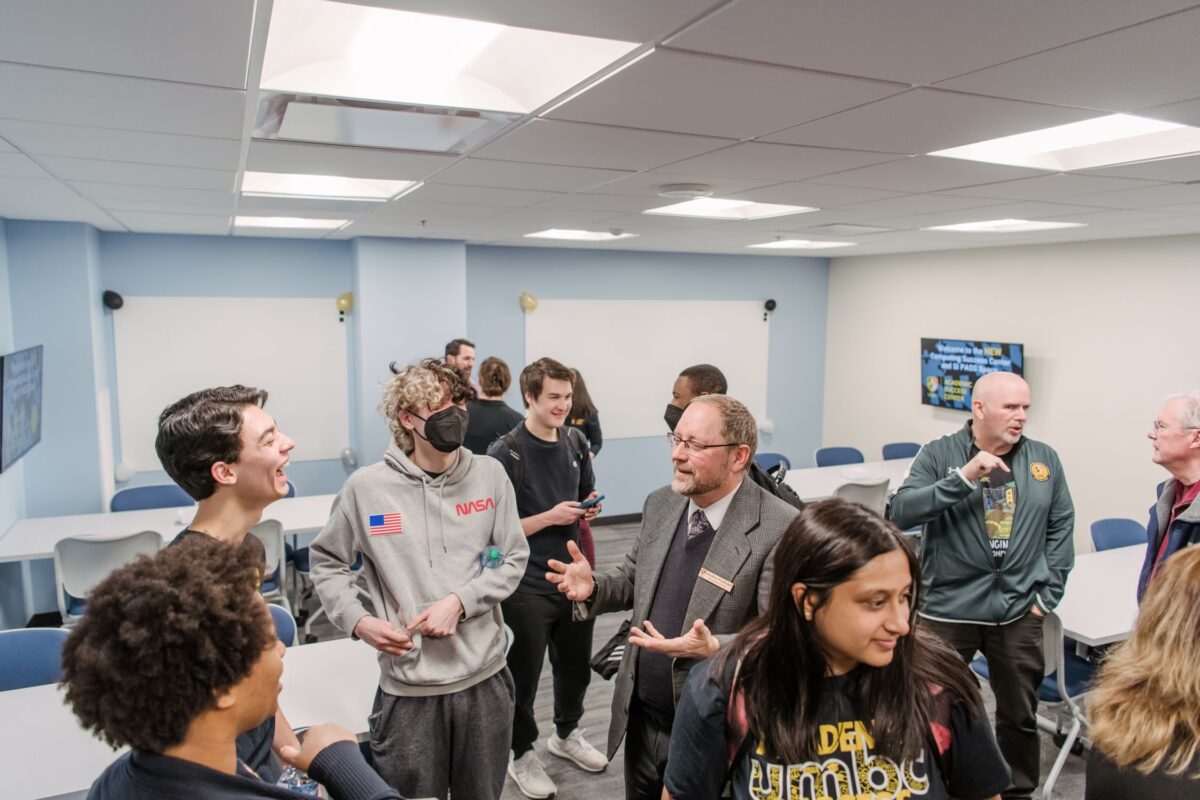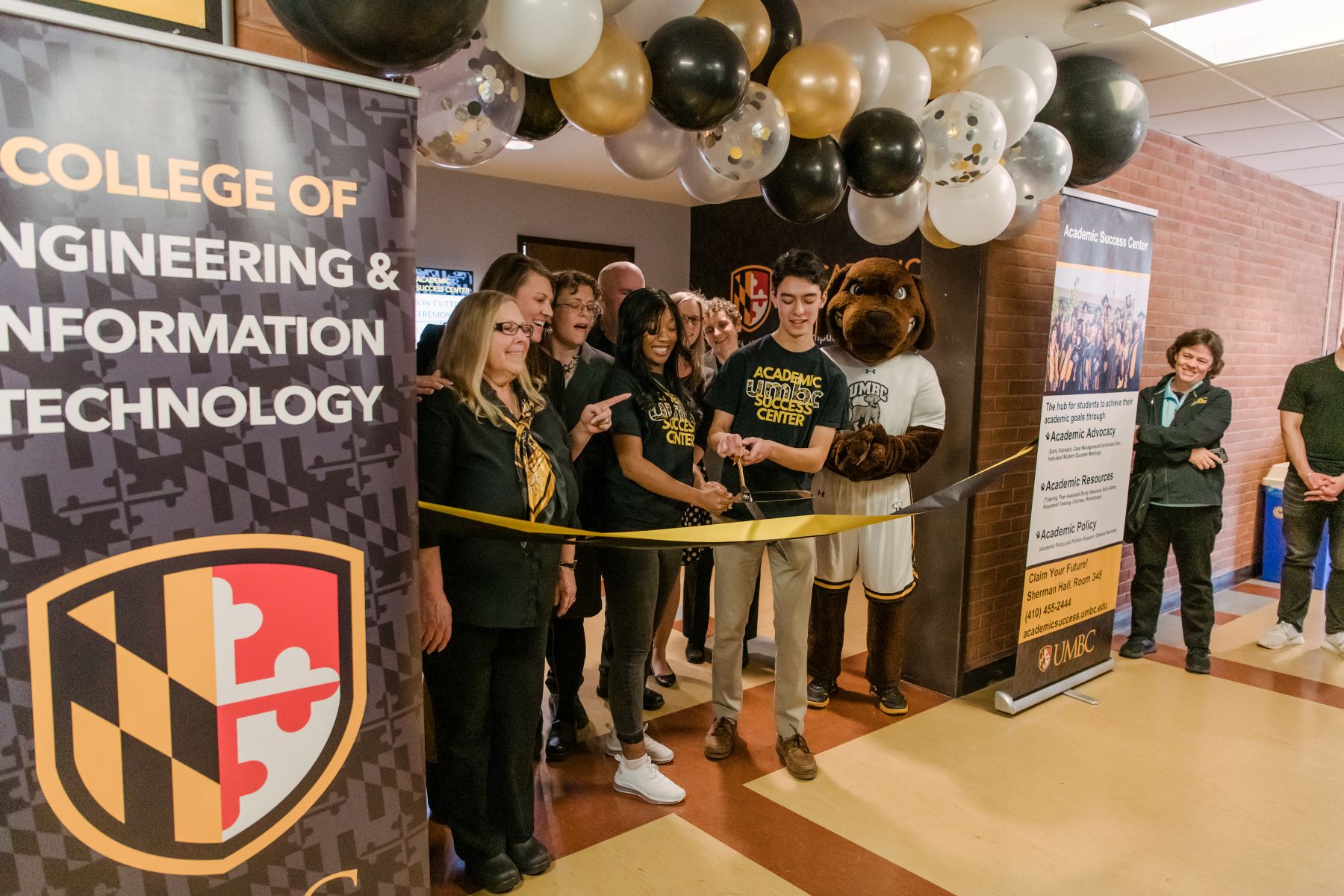On a Friday afternoon in late February, two students hoisted a pair of oversized scissors and cut the ribbon for the space housing one of UMBC’s newest tutoring programs: the Computing Success Center. The Center is designed to provide peer-to-peer support to students from any major, taking any course, who have computing questions.
“The Computing Success Center started as just a few tables in the library,” says Amanda Knapp, who leads UMBC’s broader Academic Success Center. Since the Computing Success Center tutoring program launched in 2020, it has seen skyrocketing demand.
“We are so happy for our students to now have a dedicated space for computing support, as a result of successful collaborations and valued partnerships from across the university,” says Knapp, associate vice provost and assistant dean for Undergraduate Academic Affairs. “We are thrilled to introduce new tutoring options to the growing portfolio of academic support offerings available to all undergraduate students.”
The growing demand for Computing Success Center services reflects in part increased demand for computing education. Over the past ten years, the number of UMBC students pursuing a computing-related bachelor’s degree in the College of Engineering and Information Technology (COEIT) has increased by more than 60%. During that same time, the number of computing degrees awarded to women and students from racial and ethnic groups traditionally underrepresented in computing fields increased at an even higher rate.
The Computing Success Center is one of many UMBC initiatives that is boosting the success of diverse students in high-demand computing fields.
“At both the undergraduate and graduate level, applications for our programs from a broad diversity of students are incredibly strong,” says Keith Bowman, the dean of COEIT. “New students have shared that more senior students’ positive views of our programs inspired them to pursue computing degrees, which we find very gratifying.”
Careful course design
When Annamaria Palmiero came to UMBC as a freshman in 2021, she had never programmed before. Still, she was curious about the subject, and a good friend encouraged her to try it out. So, she enrolled in a class—called Computational Design and Thinking, or COMP101—designed with students like her in mind.
The course, which debuted in 2012 and has become increasingly popular, assumes no prior experience with computing. It provides students with a broad overview of the field, builds their technical and professional skills, and gives them opportunities to work on group projects. Since 2019, it has also focused on ethical considerations in computing, a component of the course that was designed and implemented under the leadership of UMBC’s Engineering and Computing Education Program.
“Many students say the course helps them feel less intimidated by coding. It also helps them decide which computing program is best for them,” says Mark Berczynski, a lecturer who has been teaching the course since 2019. UMBC offers a broad range of computing pathways, such as majors and minors in computer science and information systems and majors in business technology administration and computer engineering.
The course has been shown to increase the likelihood that students, especially women, will stay in a computing major. For Palmiero, the experience in the course convinced her to pursue a computer science degree in addition to her already planned statistics degree. She has also become a teaching fellow for the course.
“COMP101 provided a safe space for me to launch into programming, without the overwhelmingly fast-paced nature of other introductory computing courses. I’m unsure if I would have ever become a computer science major, let alone tried programming, if it wasn’t for the course,” Palmiero says.
Other students who have taken COMP101 agree. Drew Barlow took the course in 2019 because he hadn’t taken the precalculus math classes required for a typical first computer science course. He is now pursuing a Ph.D. in computer science at UMBC. “I can definitely attribute my love for this subject in many ways to my experience in COMP101,” he said.
The ethos behind the design of COMP101—to break down barriers to success in computing for students from a variety of backgrounds—also pervades other curriculum decisions in COEIT, from adding courses to help transfer students with backgrounds in different coding languages, to forging pathways for students who wish to transfer between computing degree programs.
Easy access to support
Carefully designed computing courses start students on the road to success, while services such as the Computing Success Center help students deepen their knowledge as they progress in their studies. The center offers drop-in tutoring, including both course-specific resources and general guidance in programming languages. All of the course-specific tutors are supporting students in classes they have taken themselves.
The Computing Success Center responds to expanding demand for this kind of support. In fall 2022, the Center logged nearly 1,500 student visits, a more than ten-fold increase from when it launched in fall 2020.

Ariana Pray, a sophomore computer science major, says the tutoring at the Center goes beyond helping her complete assignments, offering conceptual guidance that has made her a more efficient coder. She appreciates the wide range of tutoring times available and the opportunity to learn from her peers in person.
“I definitely recommend going to the Computing Success Center,” she says. “You’ll come away with a better understanding of the material and will be better prepared when it comes time for exams.”
Students can also access mentoring in study skills and time management, personalized assistance from academic advocates, and other support through the broader Academic Success Center. Meanwhile, departments that offer computing degrees have worked to foster a culture where students make it a habit to access additional learning resources early and often.
Opportunities to connect and explore
While supporting academic success is a priority for computing programs, that goes far beyond coursework. UMBC faculty and staff mentor students as they seek to discover their passions and find pathways to meaningful careers.
Shaniah Reece is a senior information systems major and Center for Women in Technology Scholar who credits the culture of UMBC for helping her discover how to connect a technical career to her values and passions.
“I care about social justice and equity,” she says. “I’ve realized I can apply technical tools to study and address these issues.”
Recently, Reece has been working with James Foulds, assistant professor of information systems, to identify biases in artificial intelligence systems and work to improve their fairness. She plans to continue her research career and is currently deciding between graduate programs at Emory University, the University of Southern California, and the University of Pittsburgh.
Reece says her classwork and her mentors helped her think outside the box and identify career options that were truly meaningful to her. She shares, “My whole experience at UMBC, not just in research but throughout my time here, helped me discover who I am.”

